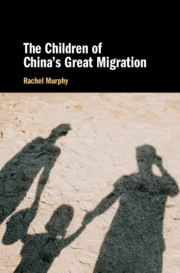Book contents
- The Children of China’s Great Migration
- The Children of China’s Great Migration
- Copyright page
- Contents
- Figures and Maps
- Tables
- Acknowledgements
- 1 Understanding the Lives of Left-Behind Children in Rural China
- 2 Migration, Education and Family Striving in Four Counties of Anhui and Jiangxi
- 3 Sacrifice and Study
- 4 Boys’ and Girls’ Experiences of Distribution in Striving Families
- 5 Children in ‘Mother At-Home, Father Out’ Families
- 6 Children of Lone-Migrant Mothers and At-Home Fathers
- 7 Children in Skipped Generation Families
- 8 Left-Behind Children in Striving Teams
- Appendix: Field Research on Left-Behind Children in China
- Bibliography
- Index
8 - Left-Behind Children in Striving Teams
Published online by Cambridge University Press: 06 August 2020
- The Children of China’s Great Migration
- The Children of China’s Great Migration
- Copyright page
- Contents
- Figures and Maps
- Tables
- Acknowledgements
- 1 Understanding the Lives of Left-Behind Children in Rural China
- 2 Migration, Education and Family Striving in Four Counties of Anhui and Jiangxi
- 3 Sacrifice and Study
- 4 Boys’ and Girls’ Experiences of Distribution in Striving Families
- 5 Children in ‘Mother At-Home, Father Out’ Families
- 6 Children of Lone-Migrant Mothers and At-Home Fathers
- 7 Children in Skipped Generation Families
- 8 Left-Behind Children in Striving Teams
- Appendix: Field Research on Left-Behind Children in China
- Bibliography
- Index
Summary
Chapter 8 reflects on findings from the preceding chapters, concluding that parental migration profoundly changed children’s relationships with the adults in their families. The children were socialised to see their parents’ migration as generating an intergenerational debt for them to repay through study. Simultaneously, children’s perceptions of their families’ care for them were influenced by (1) a future-oriented striving ethos that valorised youth and cities over elders and rurality, and (2) social constructions of motherhood and fatherhood that shaped ideas about the kinds of care and investment necessary to prepare children for decent urban futures. In drawing on the cultural repertoires that people took for granted, striving struck at the heart of the rural family such that pathways to ‘recognition’ within and beyond the family cohered: failure at school or in the labour market was failure as a child, parent, or spouse. This chapter questions the inevitability of ceaseless multi-local family striving. Children, with their natural emphasis on reciprocity highlight the basic human need for social protection, intimacy, interdependence, affective wellbeing and shared time. China’s-policy makers see further urbanisation as the answer to the problem of left-behind children. But can their development plans ever heed a child-inspired ethic of care?
Information
- Type
- Chapter
- Information
- The Children of China's Great Migration , pp. 215 - 233Publisher: Cambridge University PressPrint publication year: 2020
